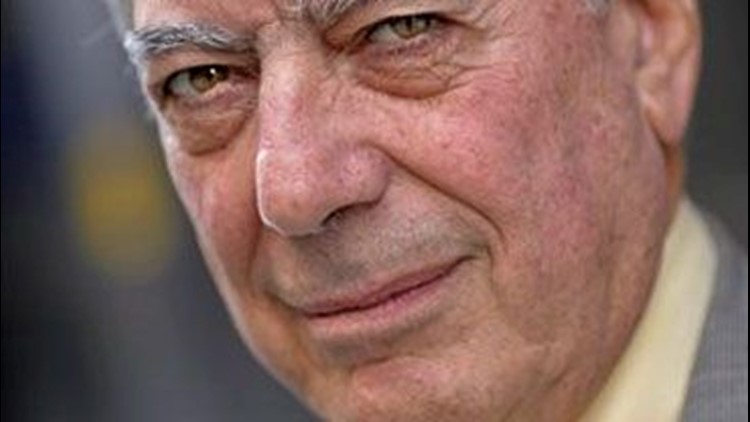STOCKHOLM (AP) — Peruvian Mario Vargas Llosa won the 2010 Nobel Prize in literature on Thursday as the academy honored one of the Spanish-speaking world's most acclaimed authors and an outspoken political activist who once came close to being elected president of his tumultuous homeland.
Vargas Llosa, 74, has written more than 30 novels, plays and essays, including "Conversation in the Cathedral" and "The Green House." In 1995, he won the Cervantes Prize, the most distinguished literary honor in Spanish.
"I am very surprised, I did not expect this," Vargas Llosa told Spanish National Radio, adding he thought it was a joke when he received the call.
"It had been years since my name was even mentioned," he added. "It has certainly been a total surprise, a very pleasant surprise, but a surprise nonetheless."
The Swedish Academy said it honored him for mapping the "structures of power and (for) his trenchant images of the individual's resistance, revolt and defeat." Its permanent secretary, Peter Englund, called him "a divinely gifted storyteller" whose writing touched the reader.
"His books are often very complex in composition, having different perspectives, different voices and different time places," Englund said. "He is also doing it in a new way, he has helped evolve the art of the narration."
Vargas Llosa is the first South American winner of the prestigious 10 million kronor ($1.5 million) Nobel Prize in literature since Colombian writer Gabriel Garcia Marquez won in 1982.
The two have long been rivals, and after the announcement Garcia Marquez tweeted: "cuentas iguales" — "now we're even" in Spanish.
In the previous six years, the academy had rewarded five Europeans and one Turk with the literature Nobel, sparking criticism that it was too Euro-centric. Last year's award went to German writer Herta Mueller.
Vargas Llosa had long been mentioned as a possible Nobel candidate — he has won some of the Western world's most prestigious literary medals and his works have been translated into 31 languages, including Chinese, Croatian, Hebrew and Arabic.
His writing is almost universally admired in Latin America but his gradual shift from the left toward an embrace of free-market capitalism has put him at odds with much of the hemisphere's intellectual elite.
Vargas Llosa has feuded with Venezuela's leftist President Hugo Chavez and often tosses barbs at Cuba's Fidel Castro. He reportedly has not spoken in decades with Garcia Marquez, a former friend who remains close to Castro.
He even irritated his centrist friend Octavio Paz, the late Mexican Nobel literature laureate, by playfully describing Mexico's political system — which was dominated at the time by a single party — as "the perfect dictatorship."
In a famous incident in Mexico City in 1976, Vargas Llosa punched out Garcia Marquez, whom he would later ridicule as "Castro's courtesan." It was never clear whether the fight was over politics or a personal dispute.
The Swedish Academy has previously been accused of favoring left-leaning writers, although the 16-member panel says its decisions are made on literary merit alone.
Vargas Llosa has lectured and taught at a number of universities in the U.S., South America and Europe, and was spending this semester at Princeton University in Princeton, New Jersey.
Fellow Nobel laureate and Princeton faculty member Toni Morrison praised his selection as a "brilliant choice."
Jonathan Galassi, head of Vargas Llosa's U.S. publisher, Farrar, Straus & Giroux, called him "one of the world's greatest writers — an eloquent, unequaled champion of human freedom."
Vargas Llosa emerged as a leader among the so-called "Boom" or "New Wave" of Latin American writers, bursting onto the literary scene in 1963 with his groundbreaking debut novel "The Time of the Hero" (La Ciudad y los Perros), which builds on his experiences at the Peruvian military academy Leoncio Prado.
The book won the Spanish Critics Award and the ire of Peru's military. One thousand copies of the novel were later burned by military authorities, with some generals calling the book false and Vargas Llosa a communist.
The military academy "was like discovering hell," Vargas Llosa said later.
At 15, he was a night-owl crime reporter. Still in his teens, he joined a communist cell and eloped with 33-year-old Julia Urquidi — the Bolivian sister-in-law of his uncle. He later drew inspiration from their nine-year marriage to write the comic hit novel "Aunt Julia and the Script Writer" (La Tia Julia y el Escribidor).
After they divorced, Vargas Llosa in 1965 married his first cousin, Patricia Llosa, 10 years his junior, and together they had three children.
In the 1970s, he denounced Castro's Cuba and slowly turned his political trajectory toward free-market conservatism. Vargas Llosa drew his inspiration mostly from his Peruvian homeland, but preferred to live abroad in near self-imposed exile for years at a time.
In 1990, he ran for the presidency in Peru on a pro-business ticket during the height of the bloody Maoist Shining Path insurgency but lost the election to a virtually unknown academic, Alberto Fujimori.
Disheartened by the broad public approval for Fujimori's iron-fisted rule, Vargas Llosa again left his homeland and took Spanish citizenship, living in Madrid and London. He maintained a penthouse apartment in the Peruvian capital of Lima overlooking its Pacific coast, but tended to keep a low profile during visits home long after Fujimori fled to Japan in 2000, toppled by vast corruption in his government.
In 1994, Vargas Llosa became the first Latin American writer to be elected to the Spanish Academy, where he took his seat in 1996.
"Spain has been very generous with me," Vargas Llosa said in a radio interview in Peru. "I wrote and published my first stories there."
The 2010 Nobel Prize announcements began Monday with the medicine award going to British professor Robert Edwards for fertility research that led to the first test tube baby.
Russian-born scientists Andre Geim and Konstantin Novoselov won the physics prize for groundbreaking experiments with graphene, the strongest and thinnest material known to mankind.
The chemistry award went to American Richard Heck and Japanese researchers Ei-ichi Negishi and Akira Suzuki for designing techniques to bind together carbon atoms.
The peace prize will be announced on Friday and the economics prize next Monday.
The awards were established by Swedish industrialist Alfred Nobel — the inventor of dynamite — and are always handed out on Dec. 10, the anniversary of his death in 1896.
____
Associated Press writers Louise Nordstrom in Stockholm, Daniel Woolls in Madrid, Carla Salazar in Lima, Peru, Frank Bajak in Bogota, Colombia and National Writer Hillel Italie in New York contributed to this report.
Copyright 2010 The Associated Press.



